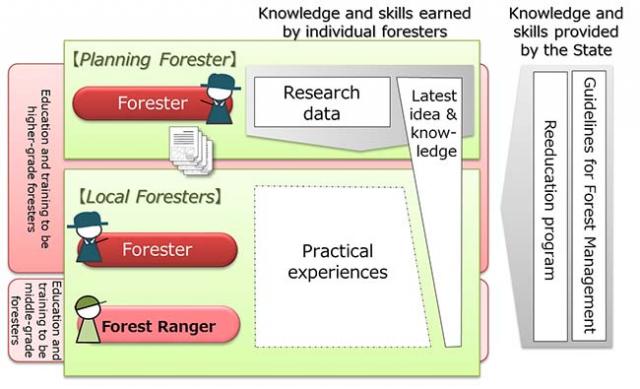Home > Research > Research Results > Research Results 2020 > Foresters in Germany cultivate knowledge and skills via on-site experience
Update:April 6, 2020
Main content starts here.
Foresters in Germany cultivate knowledge and skills via on-site experience
| Article title |
The role of foresters and utilization of their knowledge in forest management systems in Germany: Focusing on the forest management plan in Baden-Württemberg |
|---|---|
| Author (affiliation) |
Ryoko Ishizaki (a) (a) Research Planning and Coordination Department, FFPRI, Tsukuba, Ibaraki, Japan. |
| Publication Journal |
Ringyou Keizai, 71(11):1-16, February 2019 DOI:10.19013/rinrin.71.11_1( External link ) |
| Content introduction |
For the development of human resources for forest management in Japan, much attention is being focused on foresters in Europe. In particular, in German-speaking countries, foresters have advanced knowledge and skills in forest management, and a great deal of knowledge regarding how to train foresters at training institutions, including curriculum, has been accumulated. However, little attention has been paid to practical situations involving the knowledge and skills of foresters in German-speaking countries being put to effective use. Therefore, how the knowledge and skills of the foresters in Germany are being used in the forest management is clarified through the case study in Baden-Württemberg (hereafter “BW”) in Southwest Germany. The crucial element of forest management in BW is the knowledge and skills earned through practical experience by individual local foresters belonging to the forestry department of the local government. Younger foresters (hereafter “planning foresters”) belonging to the regional government (regional forest agency) are responsible for periodic management planning in state-owned and municipal forests. The knowledge amassed by local foresters based on their practical experience together with the latest information and the data from on-site forest research performed by planning foresters are discussed and used for creating policies regarding forest practices in that site. This process provides a good opportunity for foresters with different levels of experience to improve their knowledge and skills. The approach taken in BW for improving the knowledge and skills of individual foresters through experience in the forest management process provides an excellent example that could be used to build an effective system of human resource development for foresters in Japan.
Figure: The knowledge and skills of foresters in German-speaking countries applied in the development and management of a periodic forest management plan. A plan is proposed following a discussion between local foresters from the forestry department, who have a wealth of practical experience, and planning foresters, who are abreast with the latest ideas and research data. Higher-grade foresters are required to have a master’s degree or above and middle-grade foresters are required to have a bachelor’s degree or above; they are civil servants specializing in forestry who are carefully selected from a pool of applicants. They stay typically longer in a certain area than civil servant at corresponding positions in Japan, which is 10 years or more for a department chief and 20 years or more in many cases for a local forester in charge of the jurisdiction. |
Copyright © Forest Research and Management Organization. All rights reserved.

